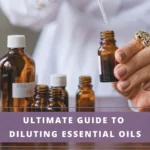As an Amazon Associate I earn from qualifying purchases. See Full Disclosure Here
Using natural sleep remedies for insomnia beats the pharmaceutical alternative. When you use natural remedies for sleeping, you don’t have to worry about experiencing any side effects.
If you’re struggling to get a good night’s sleep, try one or more of these sleep insomnia remedies and see the difference it makes! You’ll wake up the next morning feeling refreshed, re-energized, and ready to face the day head-on.

How Insomnia Affects You
Anyone who struggles to fall asleep every night knows how frustrating it can be when they just can’t seem to doze off. Or when they manage to doze off but keep waking up several times a night.
Regardless of the specific reason, lack of sleep can seriously compromise your health, happiness, and energy levels. All that tossing and turning trying to sleep leaves you feeling irritated and fatigued the next day. Chronic insomnia can also lead to health issues, putting you at increased risk of heart disease, diabetes, high blood pressure, and obesity.
Using natural remedies for sleep can help you conquer that frustrating insomnia and get the restful sleep you need.
Why Use Natural Sleep Remedies For Insomnia?
Yes, there are over-the-counter sleep medications and they work very well too. But while they do help you help you sleep, you’ll become dependent on them after a while.
I’ve never had a positive experience with OTC medicines for sleep. Yes, they helped me fall asleep but it was never a restful sleep. Most times I ended up having random strange dreams that left me feeling groggy and strange when I woke up.
Natural sleep remedies encompass holistic techniques that do not interfere with your body systems or your circadian rhythm. If you’re going through any medical treatment, you should speak to your doctor before trying out any sleep insomnia remedies of any kind.
In this guide, you’ll find 15 natural remedies that will help you get a good night’s sleep. All these are holistic methods and will not interfere with any medical treatment you’re going through. However, it’s always a good idea to discuss what you’re doing with your doctor so that he or she is apprised of what you’re doing. Although these natural sleep insomnia remedies won’t interfere with any medical treatment you’re on, it’s better to take that extra cautionary step.
Top 21 Natural Remedies For Sleep
 Natural sleep insomnia remedies for insomnia focus on maintaining sleep hygiene in the bedroom. So what is ‘Sleep hygiene?’ This is an interesting term where hygiene means more than just keeping the bedroom clean. It actually refers to a number of things that you can do to promote a better night’s sleep, including being mindful of environmental cues.
Natural sleep insomnia remedies for insomnia focus on maintaining sleep hygiene in the bedroom. So what is ‘Sleep hygiene?’ This is an interesting term where hygiene means more than just keeping the bedroom clean. It actually refers to a number of things that you can do to promote a better night’s sleep, including being mindful of environmental cues.
These 20 natural remedies for sleep have been proven to work for thousands of people. This is not an untested theory. Apply them and see the difference it makes to your sleep.
1. Use your bedroom for sleeping ONLY
Whether you work at home or in an office, resist the temptation to carry your laptop to bed so you can squeeze in a little more work. This habit can be very disruptive. Using your bedroom as a home-office generates energetic vibes in the room, which is counterproductive to sleep.
When you use your bedroom only for sleeping only, your mind associates it with sleep and will automatically start to unwind and relax when you get into bed.
The only exception to this rule is using your bedroom for sex. It’s worth breaking this rule for.
2. Keep your bedroom dark when sleeping
You’ll get the best quality sleep in a darkened bedroom. This is because the body needs complete darkness to produce and release melatonin, which is a sleep-inducing hormone.
Use thick drapes or blinds to prevent outside lights from filtering into your bedroom. And unplug all electrical appliances that give off those red flickering lights when switched off but plugged in. You want to aim for complete darkness to get the best sleep quality.
3. Don’t let light hit your eyes while you’re sleeping
The faintest light can seem extremely bright in a darkened room and little light can jar you awake from the deepest sleep. When this happens, it can be very difficult to go back to sleep. Using a sleep eye mask is the easiest way to keep any type of light out of your eyes.
A contoured cup sleep eye mask takes this benefit one step further. The soft cushiony edges of the eye mask fit snugly around your eyes to block out the light while the contour in the center lifts the eye mask just enough so it doesn’t put any pressure on your eyes.
4. Use a white noise machine to drown out disturbing noises
It’s almost impossible to drown out all noises in the night. In the city, the night is abuzz with the sounds of traffic and sirens. In rural areas, there’s always that cockerel that decides to wake up too early.
If noises keep you up at night but you don’t like using earplugs while sleeping, a white noise machine can help. The most popular white noise machines are designed to emit a plain ‘white noise’ that sounds like air whooshing gently and continuously.
These are the top-rated white noise machines on Amazon, with as many as 20,000 to 45,000 ratings!
There are also other models that allow you to customize the white noise sounds. You can choose from frequencies that sound like falling rain, the crashing of ocean waves, or wind chimes moving in a breeze. These sounds essentially overload our auditory systems and provide a distraction from competing sounds. It prevents us from zeroing in on any one sound, so we simply become “numb” to them all.
5. Sleep at the same time every night
When you go to sleep at the same time every night, it establishes a pattern that your brain and body adapt to over a period of time. In time, you will notice that you feel sleepy and start yawning as your set bedtime approaches. Your body automatically starts to wind down and prepares you to sleep. This is a good sleeping pattern.
If you sleep at a different time every night, your body cannot figure out when to start slowing down.
6. Use Aromatherapy for Sleep
There are so many different ways you can use aromatherapy to help you drift off to sleep.
Add a few drops of Lavender, Roman Chamomile, or Ylang Ylang essential oil to your diffuser around bedtime.
Prefer a more complex blend for sleeping? Add any one of these Deep Sleep Essential Oil Blends to your diffuser.
Spray this Blissful Dreams Lavender Pillow Spray over your pillow before getting into bed.
Soak in a warm bath to which a few drops of essential oil are added. The warm water and the aroma of the oil will help you unwind and relax so you fall asleep more easily. How to use essential oils in the bath and turn an ordinary routine into a relaxing spa session.
Another fantastic way to get the benefits of essential oils for sleep is by wearing an aromatherapy sleep mask. This Lavender Weighted Eye Mask is filled with premium, lightweight compression beads and scented with lavender. The weight compression combined with the soothing lavender aroma induces a feeling of relaxation and promotes sleep while at the same time relieving eye fatigue.
7. Buy the best quality mattress you can afford
It may just be your mattress that’s causing your insomnia. Is yours old or outdated? Is it too firm or not firm enough? It’s worth investing in a good quality mattress that can help cradle you into a slumber.
A good mattress is soft enough to be comfortable yet firm enough to support your body and keep it properly aligned. Your body needs sufficient support when you sleep or you’ll wake up with neck aches and back pain.
8. Use a temperature-control pillow
Temperature control pillows contain gel, which reacts to your body temperature. When you put your head down on the pillow, the gel reacts to your body temperature by actually getting colder. This lowers the temperature within the pillow, which then lowers your body temperature. This helps you sleep better.
These pillows are also called temperature-adjusting pillows or temperature-regulating pillows. Most are also hyper-allergenic and can be machine washed.
Temperature control pillows are generally made up of gel-infused memory foam, which gives you the benefit of the cooling gel as well as the memory foam. All brands are available in 4 sizes – Queen, King, Toddler, & Baby and most are adjustable, washable, and breathable too.
9. Breathe Slowly and Deeply For A Few Minutes
One of the best techniques for sleeping quickly is to breathe deeply. The breathing technique is simple enough to learn and master.
All you need to do is inhale deeply for 5 seconds. Now hold your breath for a count of 3 seconds and then exhale slowly for a count of 5 seconds. Aim to do this 10 to 15 times.
This technique works so well because it relaxes your body and lowers your heart rate. This puts your body in a state that makes it crave sleep. This is one of the easiest and most effective natural sleep remedies for insomnia.
10. Meditate for a few minutes before going to bed
Meditation has a restorative effect on the brain. It reduces stress levels, helps you relax, and promotes a good night’s sleep. Doing your deep breathing exercise before meditation can be doubly beneficial as it slows your body down while also calming the mind.
Mindful meditation in particular can be very effective for combating insomnia. It invokes a relaxation response, helping you relax enough to fall asleep quickly and stay asleep through the night.
If you are not familiar with mindful meditation, this Practicing Mindfulness guide may help.
11. Cover yourself with a weighted blanket
Weighted blankets are designed to be heavier than regular blankets. They work on the principle of ‘deep pressure stimulation’. This is a therapeutic technique that uses firm, controlled pressure to induce a feeling of calm.
What gives these blankets the extra weight is the filling inside, which may consist of tiny plastic or glass beads or pellets, or some other type of heavy fill.
When you sleep under a weighted blanket, the deep pressure stimulation stimulates the production of serotonin, a mood-boosting hormone, and melatonin, the sleep hormone. At the same time, it hampers the production of the stress hormone cortisol. This provides the optimum hormone levels for overcoming insomnia and improving overall sleep quality.
In addition, the added pressure helps steady your heart rate and calm your breathing, making it easier to relax and settle in for a good night’s sleep.
12. Exercise regularly but not close to bedtime
You may have noticed that when you spend a day swimming at the beach and running about in the sun, by nightfall you can’t wait to hit the sack. This is because physical exertion tires the body. Your body will then need rest to recover from all that activity. It does this best by sleeping.
While exercise is great for sleep, you should not exercise too close to your bedtime. Physical activity boosts your metabolic rate and increases your blood circulation, which will keep you wide awake.
It’s best to work out early in the day so that by bedtime, you’re exhausted and can’t wait to doze off. Do not be too active before bed.
13. Practice Barefoot Earthing
What is barefoot earthing? It’s simply the practice of standing barefoot on real earth. Real earth includes any natural surface such as grass, soil, sand, or water. Standing on concrete or tarred surfaces doesn’t count.
So how does barefoot earthing help to conquer insomnia? Studies show that standing barefoot on a natural surface boosts melatonin production and also regulates cortisol levels. Both of these work together to promote better sleep.
You can practice barefoot earthing outdoors during the warmer months. During the colder months, you can use an indoor earthing mat that simulates the same effects.
Read more about the Benefits of Barefoot Earthing.
14. Lower the temperature of your body and your bedroom
You may have noticed you sleep better when it’s cooler. You can always snuggle under the blankets when it’s cool but when it’s hot you end up feeling uncomfortable and unable to sleep.
Identify your optimum sleep temperature and aim to keep your bedroom at that temperature at night.
Also, your body temperature needs to drop a little so that you start feeling sleepy. One good technique to employ is to take a warm shower before bed. This will raise your body temperature but once you step out of the shower, your body will start to cool down and this will be a cue for your body to become sleepy.
Take your bedtime shower ritual one step further by using essential oils in the shower. Make sure to use relaxing essential oils in the shower so you get the benefits of both – cooler body temperature as well as aromatherapy for sleep.
Never used essential oils in the shower before or not sure which essential oils to use in the shower for better sleep? You’ll find all the details here – How to use essential oils in the shower, and which essential oils to use in your shower to promote better sleep.
15. Avoid Caffeinated Drinks 8 Hours Before Bedtime
While a caffeine boost in the morning may be a great way to start the day on a high note, you do not need that high energy when the aim is to slow your body down.
When trying to avoid caffeine, many people make the mistake of cutting back only their coffee consumption. But caffeine is not just found in coffee only. Energy drinks, sodas, and coffee-flavored cookies and cakes all contain pretty large amounts of caffeine.
Remember, you don’t have to stop drinking coffee completely. Just limit your caffeine intake to the earlier part of the day. By nightfall, the effects of the caffeine would have dissipated and it won’t affect your sleep.
16. Sip Herbal Tea or a Glass of Warm Milk Instead
Drinking warm milk before bed is another gentle yet effective way to fall asleep. Milk contains tryptophan, which is a sleep-inducing amino acid. Warm milk gives you that lovely warm comfort feeling, which acts together with tryptophan to lull you to sleep.
Herbal teas are another very effective natural insomnia remedy. Lavender and Chamomile are the best herbal teas for sleep. Both herbs are known for their sleep-inducing properties. In addition, just sipping the warm liquid also promotes a relaxed feeling.
17. Avoid Technology At Least An Hour Before Bedtime
Watching too much television, surfing the web, or using your smartphone excessively before bedtime has an adverse effect on your sleep patterns. It stimulates the brain and keeps you alert, making it harder for it to wind down and relax.
This is because the body needs darkness to produce melatonin, the sleep-inducing hormone. The light emitted from the screens hinder the body’s ability to produce the amount of melatonin you need to induce sleep. This is detrimental because you’ll have shorter random eye movement sleep (REM) and wake up feeling tired instead of rested.
Studies show that it is best to avoid using technology for at least an hour before bed to help your body get sleepy naturally.
18. Eat Foods That Help you Sleep Better
There are several types of foods that have special properties to help you sleep better. Bananas are rich in magnesium and potassium which help to repair your muscles and relax them. Bananas also contain tryptophan which helps you sleep.
Chamomile tea, almonds, cottage cheese, sweet potatoes, oats, cherries, grapes, and honey are other foods that contain sleep-friendly ingredients. Do include these foods in your diet and you will look better, feel better and sleep better.
Eating a small serving of carbohydrates about 20 minutes before bedtime will help you to doze off faster. When you consume carbs, your body secretes insulin and sends amino acids to the muscle tissues. When it does this, the tryptophan amino acid in your body can make its way to your brain unimpeded by the other amino acids. This will aid in helping you sleep.
Don’t go overboard though. Eating a large meal at dinnertime will have an adverse effect on your sleep. Your body will need to digest the food and will not be able to rest, resulting in insomnia.
19. Take melatonin supplements
Even without using technology in bed, many of us just don’t produce enough melatonin to induce sleep. Melatonin is a hormone that’s produced naturally in the body. When it’s dark, the brain produces serotonin which is converted to melatonin, which helps you fall asleep naturally. If your body isn’t producing enough melatonin, you may need to take a supplement before retiring each
Melatonin supplements are among the most commonly used natural remedies for sleep. It’s usually one of the first things your doctor may recommend to combat insomnia. This all-natural sleep aid won’t leave you feeling groggy in the morning. You can get it over the counter without a prescription.
Do note that supplements and sleeping pills are two different things. Supplements are natural treatments while pills aren’t.
20. Take Valerian supplements
This is one of many studies that suggest that valerian may improve sleep quality without causing any side effects. If you prefer to take a sleep supplement that doesn’t contain melatonin, valerian supplements are a safe alternative.
Valerian root works by regulating the brain’s calming neurotransmitters. It is gentle and non-addictive and widely considered to be a safe and effective sleep aid.
21. Use a Sleep Apnea Mouthpiece
Do you snore and wake up gasping for air at night? These are typical symptoms of sleep apnea. Not only do these symptoms disrupt your sleep but they are also a major health risk. The reason you wake up gasping for air is because sleep apnea shuts down your airways.
A sleep apnea mouthpiece helps by repositioning your jaw or tongue to keep your airway open while you sleep. If you do have sleep apnea, this device could do more than help you sleep better. It can also save your life.
5 Important things to know when using Sleep insomnia remedies
#1. First, try to figure out what’s preventing you from sleeping easily and sleeping well. Once you get to the root of the problem, you’ll have a clearer idea of what to do to overcome the problem.
#2. It may take a while to identify which natural remedy for sleep works best for you. Sometimes, you need to combine two or three strategies for the best results. For example, you may need an eye mask and a white noise machine to keep out the light and noise. Try different tips to see what works best for you.
#3. Don’t cheat. It won’t help if you take melatonin or valerian supplements but you chase it with a cup of coffee. If you can’t sleep because you’re using the computer daily up to bedtime, herbal tea will not fix the problem. Some strategies are non-negotiable.
#4. If you have chronic insomnia, it’s a good idea to talk to your doctor about it. If your insomnia is being caused by sleep apnea, natural sleep remedies such as using a weighted blanket or a sleep eye mask won’t help. What you need is a sleep apnea mask.
#5. These natural sleep remedies for insomnia are proven to work but they do take time to work. That’s because you’re addressing the causes and not the symptoms. Sleeping pills may get you to sleep but this is just a temporary fix. Natural remedies for sleep will get to the root cause of your insomnia to fix the problem. Choose a remedy, give it a few weeks to take effect.
Have you used any of the above natural sleep remedies for insomnia? Or perhaps you use some other sleep strategies that work wonderfully for you? Tell us your experience with using natural remedies for sleep in the comments below.
Related Reads
Top 12 Natural Sleep Aids That Work
Deep Sleep Diffuser Blends With Essential Oils

Disclaimer: This information is not intended to serve as medical advice. Please consult your doctor before using any natural medication or if you experience any unusual symptoms. See Full Disclaimer here.









